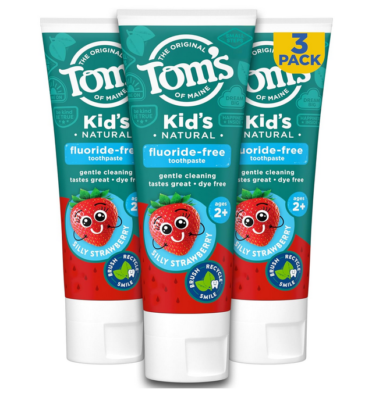More cannabis in Georgia, Tom’s toothpaste troubles, new nasal diuretic, and more
21 Nov 2024
Posted by Andrew Kantor
FDA warns Tom’s
Tom’s of Maine has a problem, according to the FDA. It’s in the form of a “black mold-like substance” and tainted water at the company’s toothpaste factory.
The FDA warned in a letter dated Nov. 5, that Tom’s of Maine — which is owned by Colgate-Palmolive — “failed to maintain buildings used in the manufacture, processing, packing, or holding of drug products in a good state of repair.”
I’m not sure which is more disturbing: That the FDA couldn’t identify the “mold-like substance,” that it was near a batch of Tom’s Silly Strawberry kids’ toothpaste,” or the fact that Tom’s of Maine is owned by Colgate-Palmolive.
GPhA awards: Nominations are open!
Who’s the best pharmacist you ever saw? How about technician? Or a student deserving a bit of recognition?
It’s time to tell us about it — to nominate someone for one, two, or more 2025 GPhA awards. They’ll be presented at the 2025 Georgia Pharmacy Convention on Amelia Island, but first we need to know who deserves them.
Head over to GPhA.org/awards to see the list of awards, the qualifications, and how to nominate someone. The deadline for nominations is January 15, 2025, so don’t wait too long!
Cannabis expansion
There are now more than 25,000 people enrolled in Georgia’s medical cannabis program, and that means the Georgia Access to Medical Cannabis Commission can authorize another six dispensaries (one each from the six companies authorized to make the low-THC oil).
Right now there are 13 dispensaries in the state. Authorized independent pharmacies had been dispensing the oil until the DEA stepped in and stopped them because … well, because it could, and because it’s still operating in the 1970s.
A better bumetanide
Sure, you might give a heart-failure patient bumetanide to reduce swelling — either in a pill or via IV. And soon there’s likely to be a nasal spray version that works just as well as the IV but is as convenient as a pill.
A new study out of North Carolina-based Cone Health found that nasal bumetanide had the same outcomes, the same few side effects, and it was absorbed faster and more reliably than the oral version. Sure, the IV version is even faster, but it’s no more effective than this nasal spray and can’t be taken at home.
Bird flu updates
A new mutation in Canada?
The teenager hospitalized in Canada with the H5N1 bird flu might have had a mutated version of the virus that makes it more transmissible among humans.
That could indicate that H5N1 has the capability to become more like a human virus, rather than an avian virus, but it is also not clear yet whether this change is meaningful and more dangerous to people, experts said.
“Ruh-ro.” —Doo, S.
“Still nothing to see, Citizen. Move along”
California has reported its own case of bird flu in a child. As in Canada, the kid had no contact with an infected animal (although he or she may have been in contact with some birds). The good news is that the child’s family all tested negative, so it looks like it’s not human transmissible.
The Long Read: Don’t not worry
An infectious-disease expert considers how much we need to worry about the bird flu. Normally it wouldn’t be a big deal (we’re pretty good at dealing with influenza), but the anti-health, anti-science atmosphere these days means all bets are off.
To quote a different expert:
“It’s great to develop diagnostics, therapeutics, and vaccines, but the problem is: It’s kind of like the ‘Field of Dreams’ phenomenon. […] There was this implicit assumption that ‘If you build it, they will come.’ What happens if they don’t come?”
Two new cholesterol drugs
Two companies have developed drugs — now in phase 2 trials — that they say cut Lp(a) cholesterol by significant amounts. Like really significant.
- Eli Lilly claims its experimental oral drug, muvalaplin, can reduce Lp(a) by about 70% according to the standard test, or almost 86% if they use a new kind of test.
- Silence Therapeutics says its zerlasiran injection led to an 80–85% reduction in Lp(a).
High Lp(a) has no treatments, affects something like 20% of the population, and most of those people don’t even know they have it.
Other injectable Lp(a) treatments in clinical testing include Lilly’s lepodisiran, Amgen’s olpasiran, and pelacarsen from Novartis.
These don’t work
You don’t often hear of negative results in studies, but here’s a double: Two separate groups of researchers, one in New York and one in Australia, found what doesn’t work for osteoarthritis.
Colchicine: The drug and a placebo showed equal effectiveness against pain and function. (Actually, the placebo was a little better.)
Herbal supplements including curcumin, pine bark extract, MSM, and Indian frankincense: As with colchicine, it was slightly less effective than a placebo.




